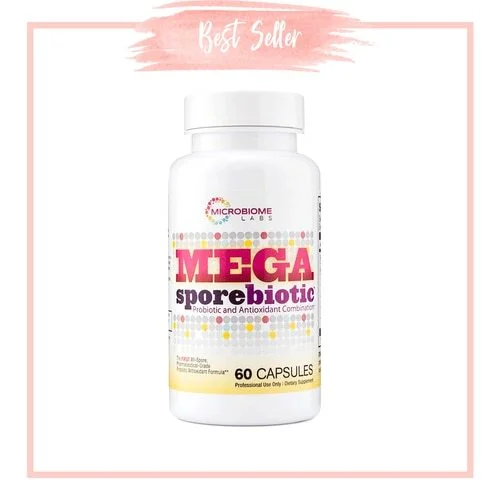By Ann Melin, Lead Health Coach at Hormone Detox Shop
If you’ve been paying attention to the world of natural healing you’ve likely come across gut-related terms like:
leaky gut
intestinal hyperpermeability
gut inflammation
mucosal barrier
Secretory IgA
Books, articles, blog posts and academic research all emphasize the importance of gut health. A few months ago, I wrote an article on the GI-Map stool test and discussed some of the current information available on the gut microbiome.
Today, I’m going to focus on the gut lining, how it gets damaged, and some of the ways to heal your gut!
The Basics of the Gut’s Anatomy and Physiology
We all know the digestive system is comprised of a long tube that runs from mouth to anus and that there are distinct portions of that tube such as the esophagus, stomach, small intestine, and large intestine. The small intestine is where we absorb most of our nutrients from food and it is this section of the alimentary canal that often gets damaged when a person develops intestinal hyperpermeability (aka, leaky gut).
Although there are several layers that make up the lining of the gut, I want to focus on the mucosal layer and its constituent parts. The mucosal barrier is made up of mucosal folds that increase the surface area of the gut, which averages about 300 square meters in the human body!
These folds increase our capacity for nutrient absorption, allowing nutrients from food to cross over into the body and the blood stream. The folds are lined with structures called villi and each villi is lined with a single layer of cells called epithelial cells. Each of these cells are lined with microvilli that help to sweep nutrients into the cell and sweep antigens and microorganisms away from the cell. The villi contain enzymes that are secreted by the mucosal layer which help to further break down food particles for maximum absorption and passage through the layer of epithelial cells.
The single layer of epithelial cells lining the gut should be held together tightly by structures called tight junctions. Tight junctions can open and close depending upon the needs of the system, foods that have been ingested, and levels of gut inflammation. Sometimes it is appropriate and necessary for some of the tight junctions to loosen temporarily; however, this becomes problematic when the integrity of the junctions gets disturbed due to chronic inflammation, infection, poor diet, or toxicity.
A substance called Secretory IgA is another important factor in gut health. Secretory IgA is a chemical immunoglobulin that is produced in a layer of the gut called the lamina propria and it gets secreted through the intestinal epithelium acting as a first line of defense against toxins and microorganisms.
Many people who have leaky gut also have either high or low levels of Secretory IgA. An elevation of Secretory IgA generally indicates infection and/or that the body is still actively trying to fight off whatever may be causing inflammation and cellular damage. A deficiency in Secretory IgA indicates that the body’s defense system has been compromised and the problem has probably become chronic.
Causes and Symptoms of Leaky Gut
Leaky gut has become a common condition in the modern world and is often caused by a combination of multiple factors including:
Highly processed foods
Pesticides and insecticides
Sugar
Refined carbohydrates
Gluten
Parasitic infections
Fungal infections
Imbalances in the microbiome (aka dysbiosis)
Heavy metal toxicity
Chemical toxicity
GMOs
Hormonal imbalances
Stress and trauma
Common symptoms include:
Gas and bloating
Food sensitivities
Autoimmune conditions
Joint pain
Chronic fatigue
Chronic skin problems
Indigestion
Anxiety and depression
The Best Ways to Heal Your Gut
Now that you know what can go wrong with your gut lining, I’m sure you want to know my favorite ways to heal your gut!
Look at Your Diet
Diet is one of the most critical things to address if you think or know that you have leaky gut. People commonly improve when they adopt an organic, anti-inflammatory diet with a focus on Paleo-friendly foods.
I recommend that people remove foods that are common problems. These include:
Gluten
Dairy
Corn
Sugar
Soy
Industrial seed oils
Additionally, many people find that removing all grains and many legumes may be helpful for a time. Many others have specific sensitivities to common foods that may be healthy for some but can be harmful and provocative for others. Food sensitivity testing and elimination diets can help you to identify specific foods that may be triggers for you.
Evaluate Your Lifestyle
Lifestyle factors play an incredibly important role in overall health, including gut health. Stress has a direct impact on Secretory IgA so managing stress can be critical in the process of gut healing. Many of us live lives that are out of balance in our modern world. Self-care in the form of adequate sleep, appropriate exercise, healthy social relationships, and beneficial stress-reducing practices can go almost 300 square meters towards optimizing health!
Consider Using Herbs
Herbs have a long history of use as digestive aids. Many know of ginger and peppermint as herbs that can help ease and soothe digestion. The following herbs are ones that I commonly use in my practice to support gut health and healing:
Slippery elm
Marshmallow
Aloe
Deglycyrrhizinated Licorice (aka DGL)
L-Glutamine (Okay, this is actually an amino acid, not an herb, but it’s great for gut healing!)
Try Gut-Healing Supplements
Microbiome Labs (the developers, producers and manufacturers of the infamous MegasporeBiotic) have developed a suite of gut repair products that have quickly become our new favorite gut healing supplements here at the Hormone Detox Shop.
This is one of our favorite ways to heal your gut. We like to use four of their products which, when taken together, recondition, reinforce, and rebuild the gut:
MegaSporeBiotic. We use this to recondition the gut. This product is the signature product of Microbiome Labs and it was “the first 100% spore-based, broad-spectrum probiotic clinically shown to support healthy gut barrier function” (as the product handout explains). This product is made up of Bacillus spores that improve gut immunity, promote a healthy mucosal barrier, and can withstand the harsh environment of the human digestive tract and make their way to the colon where the spores become activated and can begin to colonize the gut.
MegaPreBiotic. We love MegaPrebiotic because it reinforces the changes that result from taking MegaSporeBiotic and helps promote increased diversity in the microbiome. Prebiotic supplements are made of insoluble fibers that are not digestible by humans; however, they can be incredibly beneficial in that they act as food for beneficial microorganisms in the human digestive tract thereby encouraging a flourishing microbiome. Unfortunately, most prebiotics can feed harmful microbial species as well as feeding beneficial microbes. MegaPreBiotic has been uniquely formulated to selectively feed keystone beneficial bacteria such as Akkermansia muciniphila, Faecalibacterium prausnitzii, and Bifidobacteria.
MegaMucosa. This product rebuilds the mucosal lining by offering supplementation with dairy-free immunoglobulins and citrus extracts that have been “clinically shown to support microbial diversity and alleviate barrier dysfunction” (as the product handout states), thereby promoting a healthy immune response. By rebuilding the gut lining, MegaMucosa helps to neutralize toxins that enter the gut and reduce damage caused by exo and endotoxins.
Mega IgG 2000. Here is another dairy-free immunoglobulin concentrate derived from bovine serum. This product binds to environmental toxins and helps to remove them from the body, thereby maintaining and supporting healthy gut function.
Buy Now & Save!
We love these Microbiome Labs products because they get such great results for us and our clients.
Remember you get free shipping too at $150 within the US. We also offer a 60-day refund period. This applies to all the Microbiome Labs products in our shop, including MegaSporeBiotic, MegaPreBiotic, MegaMucosa, and Mega IgG 2000.
Remember, with any new supplement, to start with the lowest dose. Depending on your health, you may need to stay at a low dose. Just listen to your body.
Conclusion
As I said in my article on GI-Map stool testing, the father of modern medicine, Hippocrates, is famously quoted as saying, “all disease begins in the gut.” Many also believe that the inverse is true: all health begins in the gut!
Taking steps to improve your gut health is one of the best things you can do on your own personal journey towards optimized health. It doesn’t always come easily but by integrating some of the dietary and lifestyle ways to heal your gut alongside the suite of supplements discussed, I feel confident you can take several steps towards your health goals!
Learn More!
Bridgit interviewed one of the founders of Microbiome Labs, microbiologist Kiran Krishnan, for our DIY Detox Summit. Get a sneak peek of this fabulous interview below!
Ann Melin is a certified Holistic Health Practitioner, Clinical Nutritionist, a Clinical Master Herbalist, and a Functional Diagnostic Nutrition® Practitioner, and has been in the field of health since 2001. We are extremely blessed to have her as our Clinical Director and Lead Health Coach for Women’s Wellness Collaborative as she has extensive experience in running labs and creating holistic protocols based on the principles of functional nutrition. She lives in Vermont.




